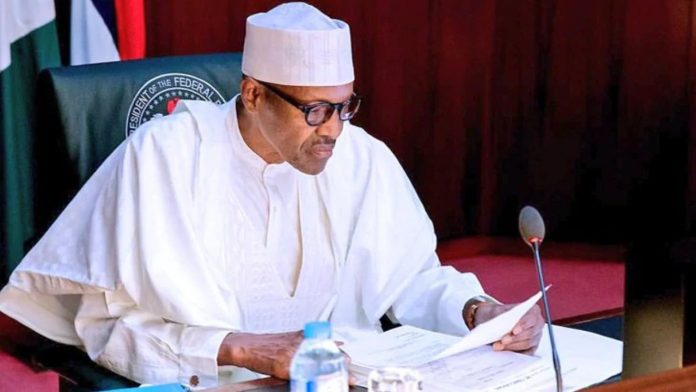President Muhammadu Buhari on Thursday in Abuja received the report on the impact of the African Continental Free Trade Area (AfCFTA) and Nigeria’s readiness for it.
The African Union Heads of States had on March 21, 2018 adopted the Phase I Agreement on the AfCFTA at its 10th Extraordinary Summit in Kigali, Rwanda.
President Buhari, however, observed the AfCFTA will have both positive and negative effects on Nigeria as a nation and the West African sub-region.
He said: “A lot has been said about Nigeria’s decision to conduct a detailed study on how this agreement will impact us as a country.
“Let me state unequivocally that trade is important for us as a nation and to all nations. Economic progress is what makes the world go around.
“Our position is very simple, we support free trade as long as it is fair and conducted on an equitable basis.
The AfCFTA will have both positive and negative effects on us as a nation and on our region.
“As Africa’s largest economy and most populous country, we cannot afford to rush into such agreements without full and proper consultation with all stakeholders.’’
The president maintained that for AfCFTA to succeed, African nations must develop policies that promote African production, among other benefits.
“Africa, therefore, needs not only a trade policy but also a continental manufacturing agenda. Our vision for intra-African trade is for the free movement of “made in Africa goods”.
“That is, goods and services made locally with dominant African content in terms of raw materials and value addition.
“If we allow unbridled imports to continue, it will dominate our trade. The implication of this, is that coastal importing nations will prosper while landlocked nations will continue to suffer and depend on aid,’’ he added.
President Buhari, therefore, stressed the need to always ensure that all negotiated agreements create business opportunities for Africa’s manufacturers, service providers and innovators.
“The AfCFTA we aspire to have should therefore not only create wealth for investors but also jobs and prosperity for our vibrant and hardworking citizens. The benefits of economic growth must be prosperity for the masses.
“I am very delighted to receive your report today and with the time spent, skills applied and energy invested, I am confident that the Committee has been thorough and diligent,’’ he said.
While thanking members of the committee, the president assured that the report would form part of the consideration in the nation decision on the next steps on the AfCFTA in particular and on broader trade integration subjects.
“Let me congratulate all members of the Committee for the work done. I thank all stakeholders and organizations including our development partners that provided support to the Committee in one form or another,’’ he added.
Speaking while submitting the report, the chairman of the presidential committee, Mr Desmond Guobadia, disclosed that the Committee reviewed over 200 submissions from various stakeholders across the country including farmers, bankers, manufacturers, government agencies and development partners.
He said the committee recommended that Nigeria should consider joining the AfCFTA and using the opportunity of the ongoing AfCFTA Phase I negotiations to secure the necessary safeguards required to ensure that the nation domestic policies and programmes are not compromised.
According to him, the AfCFTA provides immense opportunities for Nigeria’s manufacturing and service companies to expand to Africa.
“Today, many Nigerian companies have developed capacity in some of these sectors and have long desired to expand to Africa but have been constrained by trade barriers which AfCFTA is expected to remove,’’ he added.
The Committee on the Impact and Readiness Assessment of the AfCFTA was inaugurated by President Buhari on Oct. 22, 2018, to independently assess the benefits and risks of the AfCFTA to Nigeria and to propose short, medium and long-term measures to manage them.
The mandate of the Committee was to review and assess: the potential impact of the AfCFTA on Nigeria’s national development plans, fiscal and monetary policies;
“The effects of smuggling, dumping and predatory practices; the implications for intra-Africa trade patterns, legacy bilateral and multilateral trade agreements; the implications of associated free movement of persons on national security;
“Nigeria’s trade capacity, infrastructure and operating environment in order to establish our readiness as a country for the AfCFTA and identification of policies and programmes to address any observed gaps.’’


